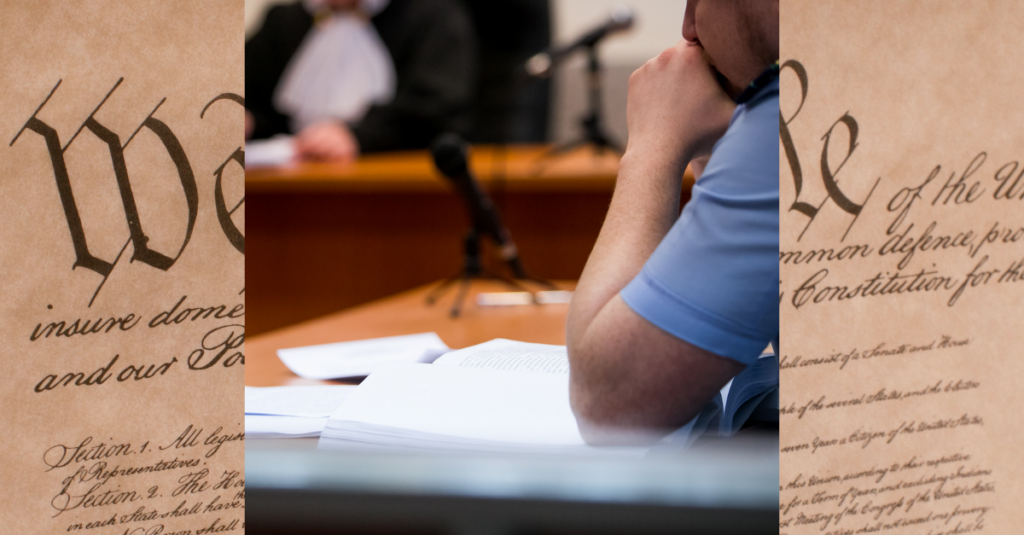Immigrants, especially vulnerable immigrant groups like unaccompanied children, are guaranteed certain protections under the Constitution and United Nations sanctions recognized by the US government (read more here). One of the most fundamental protections guaranteed to all people inside the US (including immigrants) is the right to due process, which means all people are guaranteed a fighting chance to defend their rights.
In this resource, we’ll explain how due process for immigrants is being restricted in 2025, and how it could have disastrous consequences for immigrants and even US citizens.
1. What is due process?
According to the 5th and 14th Amendments of the US Constitution, both the federal government and individual states are prohibited from depriving any person “of life, liberty, or property, without due process of law.”
This means that when life, liberty, and property are on the line, all people must be guaranteed:
- Notice
- An opportunity to be heard
- An impartial tribunal (court, jury, or judge to hear their case)
In short, all people should be treated fairly and equally under the law.
2. Does due process apply to immigrants?
Yes. According to the US Constitution, everyone is legally entitled to this protection, regardless of immigration status. This has been confirmed by the US Supreme Court. However, in practice, access to due process is not always the reality. Some people never get the chance to go before a judge, especially those navigating immigration court.
3. What does “due process” for immigrants look like in practice?
Unlike in criminal court, where people have the right to counsel, immigration is considered a civil matter; there is no public defender who steps in when an immigrant cannot afford a lawyer. This means that immigrants (including unaccompanied children who come to the US alone) are forced to represent themselves, if they’re even granted a court hearing.
Due process is best achieved when immigrants have meaningful access to a qualified legal representative or attorney, especially in the cases of vulnerable groups like unaccompanied kids and people with disabilities, so that they can have a fair shot at being heard.
It’s estimated that just 37% of immigrants across the US have access to legal representation. The Acacia Center for Justice and its partner networks work to bridge the representation gap by providing counsel and other legal services to vulnerable groups. We defend due process rights for tens of thousands of people caught in the U.S. immigration system. Learn More
4. Can a US president suspend due process?
Recent remarks from the US President cite logistical concerns as cause to violate due process, and immigrants are being deported and detained without court hearings. In some cases, they’re being imprisoned in foreign countries without criminal convictions, or even confirmation of criminal records. Convenience is not a valid reason to violate due process. Circumventing due process, a guaranteed protection for all people in the United States, defies the Constitution and is against the rule of law.
Even the invocation of the Alien Enemies Act does not permit detention or deportation without due process or the transfer of anyone to a place where they face a substantial risk of torture.
5. What’s at stake if immigrants aren’t guaranteed due process?
Restricting due process protections for immigrants undermines the Constitution and sets a dangerous precedent for a president to make future attacks on due process rights. Without universal due process protections, deportation, detention, and imprisonment are universally concerning realities for everyone in the U.S.
6. Restricting non-citizens’ rights doesn’t affect due process for citizens, does it?
Violation of due process for immigrants not only contradicts American values, but it also puts the rights of citizens and non-citizens at risk. If a US president can violate due process for immigrants, what’s to say those rights can’t be violated for citizens?
Without due process, how can the government accurately assess anyone’s claim to citizenship or legal protections? Imagine, for example, that someone is presumed to be an immigrant without legal status and is deported before they can prove their citizenship. This is not theoretical, it’s happening right now. More than a dozen citizens have been detained and deported as part of this 2025 immigration “crackdown.”
7. Can citizens really get deported without due process? Shouldn’t proving citizenship be easy?
According to US Immigration and Citizenship Services, the following documents are “usually accepted” as proof of citizenship:
- Birth Certificate, issued by a US State or US Department of State
- US Passport, issued by the US Department of State
- Certificate of Citizenship, issued to a person born outside the US who derived or acquired US citizenship through a US citizen parent
- Naturalization Certificate, issued to a person who became a US citizen after 18 years of age through the naturalization process
To prove citizenship, each of us would have to carry one of these documents around at all times to verify our citizenship. We might even have to carry multiple forms of ID, in case the validity of one of our documents was questioned. Imagine taking your birth certificate to the grocery store or the beach. This is not a secure, realistic, or simple alternative to due process.
8. What can I do to protect due process for immigrants and all people in the US?
Sign up for our email list to stay up to date on the state of immigration, make sense of the news, and help Acacia make a difference.
Your privacy is important to us.
